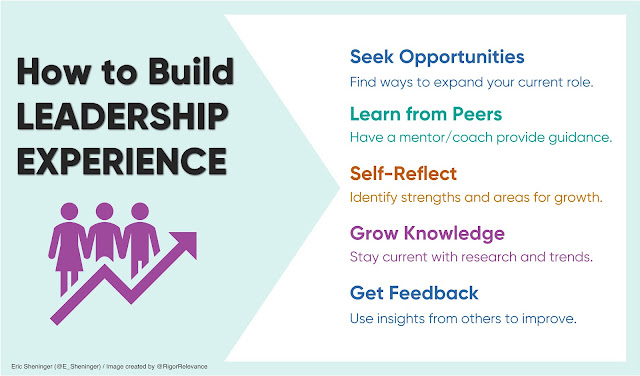I vividly remember how frustrating it was to interview for various school administrator positions only to be told that I didn’t have enough practical experience related to the position(s). Well duh, of course I didn’t, as I was an aspiring leader who was just venturing into this space. I am sure virtually everyone reading this post has been in the same situation at some point, whether in the past or currently. Frustrating is putting it mildly. It should be noted that experience can certainly be beneficial when it comes to leadership, as it can provide a leader with valuable knowledge, skills, and perspective. However, it is not the only factor that determines a person's ability to lead effectively. Some people may have a natural talent for leadership and are able to inspire and guide others, even if they don't have a lot of experience.
That being said, there are certain situations where experience can be essential for a leader. For example, if a leader is facing a complex or unfamiliar challenge, their past experiences may give them a better understanding of how to approach and solve the problem. Most would agree that the COVID-19 pandemic fits the bill here. Experience can also help a leader to build credibility and gain the respect of their team. Overall, experience can be a valuable asset for a leader, but it is not the only factor that determines a person's ability to lead.
Leadership is not necessarily about having a lot of experience but rather having the ability to inspire, motivate, and guide others toward a common goal. Eventually, I began revising my resume and linking to instances where I actively cultivated leadership characteristics or built capacity through coaching sports, writing curriculum, and advising clubs. Think about what you have done that can translate into a school administrator role.
Once you get your first position, the key is to hit the ground running. Here are a few other tips that may help you to lead effectively, even if you don't have a lot of experience:
- Set clear goals: Clearly define what you and your staff are working towards. This will help to keep everyone focused and motivated.
- Communicate openly: Make sure to keep the lines of communication open with all stakeholders. Encourage open and honest dialogue while being approachable.
- Be adaptable: Be open to new ideas and approaches and show a willingness to pivot when necessary.
- Empower your people: Trust your staff and give them the autonomy to make decisions and take ownership of their work.
- Lead by example: Show everyone what it means to be a good leader by being a good follower. Set a positive example through your own actions and work ethic.
As I shared in Digital Leadership, it's not about having all the answers but creating a vision and guiding others toward its realization.
So, what if you have never been an administrator? If you are lacking in leadership experience, there are several steps you can take to compensate for this and become a more effective leader:
- Seek opportunities to develop your leadership competencies: This can include taking on capacity-building roles within your school or district, enrolling in educational leadership programs, creating a Personal Learning Network (PLN), or participating in pertinent workshops or conferences.
- Learn from more experienced leaders: Seek out mentors or coaches who can provide guidance and support as you develop.
- Practice self-reflection: Take time to reflect on your strengths and areas for growth. This can help you to identify areas where you need to focus your professional learning efforts.
- Stay current on trends and best practices in the education field. Make an effort to stay up-to-date on the latest developments and incorporate this knowledge into your leadership style.
- Be open to feedback: Seek out feedback from others and be open to learning from their experiences and insights.
Remember, leadership is a never-ending journey and everyone starts at a different point. By being proactive in your development and continually learning and improving, you can effectively compensate for a lack of experience and become a strong and effective leader.

No comments:
Post a Comment